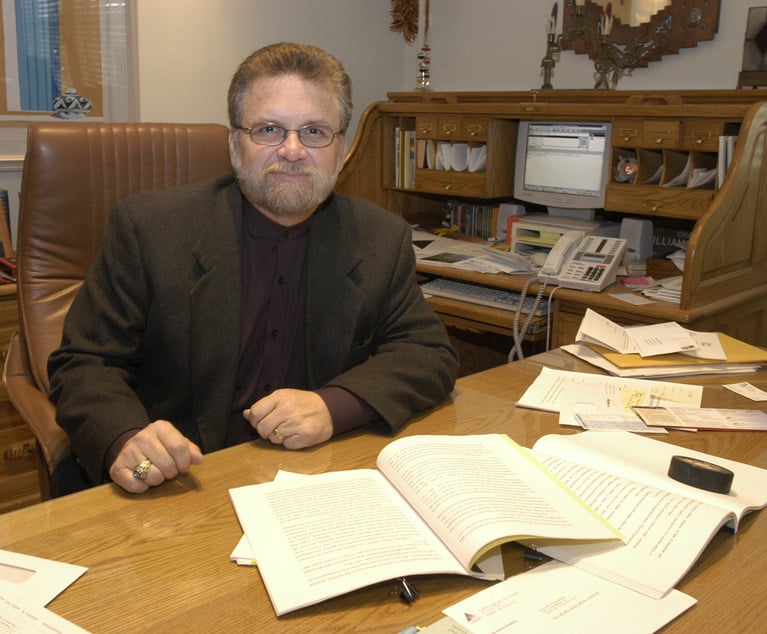I’m a words guy. I’ve been fascinated by words for as long as I can remember. I was an asthmatic child and missed a lot of school. Mom read to me when I was bedridden, and my little mind associated those words with my mother’s love.
I was soon paging through dictionaries and encyclopedias when comic books and sports pages had been exhausted. That’s where the words were so that’s where I was.
I never got enough. To this day, I find etymology as engaging as football.
It’s worked out well for me. I’ve made a very nice life out of words, prosecuted crimes, resolved disputes, helped develop the law, supported a family, traveled the world … So I appreciate how powerful words can be.
But I was still surprised at how devastating the words, “You have invasive lobular breast cancer” were when I heard them spoken to my wife.
Kelly and I have been together 25 years. The best part of my life has been my time as the lesser half of “Beds and Kelly.”
Her face at that moment is an image I’ll spend the rest of my life trying to cleanse from my memory. With no more success than Lady MacBeth.
“Cancer” is a word fraught with unique threat and foreboding. It is “The Emperor of All Maladies.” All my life it’s been an obliquely stated death sentence. It carried off my mom, and I’ve lost friends and acquaintances to it with an inevitability that seemed as irresistible as the tides.
Well, no more.
Oh sure, there are still incurable cancers. Our profession has lost some beacons to cancer, sources of light we could ill afford to be without. We’ll lose more.
But we still have others who—like my wife—are the beneficiaries of the amazing strides cancer research has made. I write today to convey the gospel of breast cancer, the good news all those pink ribbons represent. Cancer is not the word it used to be.
But Kelly’s cancer description included another scary word: invasive. She’d been very unlucky. Despite years of regular mammograms and ultrasounds, her cancer had gone undetected.
She had a kind of cancer that is very hard to detect. Lobular cancer does not form a rock in the breast that can be palpated or machine-detected with a reasonable amount of scrutiny. Instead, it infiltrates, it spreads like tree limbs, narrow little structures so near invisibility that it used to be called “the mammographer’s wife’s cancer” because it could only be detected in a mammogram that was studied assiduously.
Kelly’s did not show up on her mammogram. Nor did it show up on the follow-up ultrasound ordered when she reported a change in the way her breast looked. Only when they biopsied the breast—because you don’t take half-measures with cancer—did they find it.
And by this time it had grown for years. It was big. 11 centimeters. That’s 4 1/3 inches to you and me. Pause for a moment and look at what four inches of cancer is. The diameter of a tennis ball is 2 3/4 inches.
Our oncologist says 10 years ago they would have just thrown everything they had at it and hoped for the best. But breast cancer treatment today is not what it was 10 years ago.
Today they take biopsied tissue and send it to a lab to be genomically studied. In Kelly’s case, they learned that there was virtually no chance this particular cancer would respond to chemotherapy. It grew too slowly.
Chemotherapy works on the fact cancer cells grow fast, so they take up the poison of chemo faster than the rest of the body.1 If the cancer grows slowly, the rest of the body will be soaking up the poison at the same rate. That’s what would have happened to Kelly so there was no reason to try chemo.
They also learned it sucked up estrogen like crazy. That could be used against it. Hormone therapy would likely be very effective. The treatment plan was mastectomy2 and hormone therapy.
So Kelly geared up. She’s a trouper.3 Her expressed attitude was, “I only get one 2023; I’m not gonna let this mess up my whole year.”
My daughter Megan sent her a toy sword, a replica of the Sword of Protection wielded by She-Ra, who was one of the Princesses of Power in a 1980s cartoon series. Kelly took it to every test.4 She decided not to take it into the operating room, instead entrusting the large purse and its contents to me. So it was there if needed.
It wasn’t. Kelly was wheeled into the operating room at 1:45 in the afternoon. At 9 that night, she was in our living room watching the Angels game with me. Two days later, she walked a half-mile. She missed a week-and-a-half of work.
Unfortunately, a very small part of the cancer had reached her lymph glands. That meant radiation. Five weeks of daily radiation. She’s dealing now with the radiation burns and the fatigue.
Much as I love words, her handling of this ordeal has bankrupted my vocabulary. I can’t express my admiration. There has never been a single “why me?”. She has never felt sorry for herself or lamented the unfairness of it or yielded to depression or even melancholy. Our house has been a gloom-free zone throughout.
I’ve never been more in love.
But I said all that—I used up all those words and all your time—so I could say a couple other things.
First, with apologies to abolitionist Wendell Phillips who said it about liberty, the price of life is eternal vigilance. Vigilance was the key to Kelly’s victory. When she saw a change in the appearance of her breast (the orientation of the nipple changed; it pointed more downward), she reported it immediately. There was no lump, no pain, nothing but a change in appearance.
That is apparently a red flag, and many of our friends did not know about it.
Second, do ALL your testing. If you’re a woman, don’t skip a single examination, mammogram, ultrasound, or whatever else your doctor recommends. SHOW UP so your doctor can make those recommendations. If you’re a man, make sure she shows up. Beg, plead, cajole, whatever it takes. Don’t underestimate how much you have at stake.
Third, do not be afraid. You’ve doubtless heard LOTS of stories about breast cancer. And they’re invariably frightening. Frightening, hell, they’re terrifying.
But in encouragingly large measure, the worst ones are outdated and oversimplified. Breast cancer isn’t one disease, it’s many. Every one is different. Your cancer won’t be Kelly’s or your friend’s or your aunt’s. Yours is DIFFERENT. And if the scary story you’re hearing is 10 years old, it’s likely to have been overtaken by time and science.
Just don’t delay. Don’t deny. Don’t worry. Don’t fret. Don’t just talk to a girlfriend. See somebody. Take a tiny part of your week and go see a doctor.
These people are wizards. What they have learned, what they can do, what they can learn about your cancer, how they can attack it, the multiplicity of modalities that can be combined and arrayed against your cancer today is straight out of Buck Rogers in the 25th Century.5
So once you get over hearing that awful and awe-inspiring word, gird up, put together your team of oncologists, surgeons, nurses and technicians—all of whom do this every day and are damned good at it—take up your She-Ra Sword of Protection, and wade into battle.
You don’t survive breast cancer, you defeat it. You aren’t its victim, you’re its enemy. And you’re better armed than it is. You’ve got drugs and poisons and ray-guns and an army of professionals with strategies it’s never seen.
You can do this.
1. With the exception of hair and nail cells which grow fast and stomach lining cells, which must constantly regenerate to deal with the acid in the stomach. That’s why chemo is so hard on those parts of the body.
2. The surgeon was apologetic about her conclusion a lumpectomy wouldn’t be enough. Kelly’s response was, “Hey, you can take the breast and two fingers if you need to; I want this thing offa me.”
3. This is a much-misunderstood metaphor. The word is not “trooper;” it has nothing to do with soldiers. It comes from theater, a reference to a theater troupe’s determination that “the show must go on,” no matter what.
4. It was always concealed in a large purse. Kelly felt it would be a shame to suffer through cancer only to be killed by a hospital security guard who saw only a crazy lady with a [wooden] sword.
5. Medicine, like climate change, is faster than we expected.
William W. Bedsworth is an associate justice of the California Court of Appeal. He writes this column to get it out of his system. A Criminal Waste of Space won Best Column in California in 2018 from the California Newspaper Publishers Association (CNPA). And look for his latest book, “Lawyers, Gubs, and Monkeys,” through Amazon, Barnes and Noble, and Vandeplas Publishing. He can be contacted at [email protected].
NOT FOR REPRINT
© 2024 ALM Global, LLC, All Rights Reserved. Request academic re-use from www.copyright.com. All other uses, submit a request to [email protected]. For more information visit Asset & Logo Licensing.


 Justice William Bedsworth, California Court of Appeals for the Fourth District
Justice William Bedsworth, California Court of Appeals for the Fourth District




